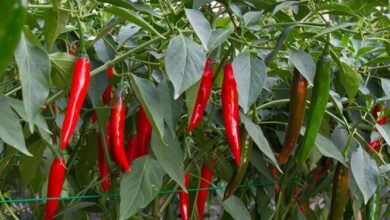Polysulphate: a unique natural multi-nutrient fertilizer for fruits and vegetables
Polysulphate is a natural mineral (polyhalite) with a low carbon footprint and it is approved for organic agriculture
Dr Patricia Imas, ICL Fertilizers, patricia.imas@icl-group.com
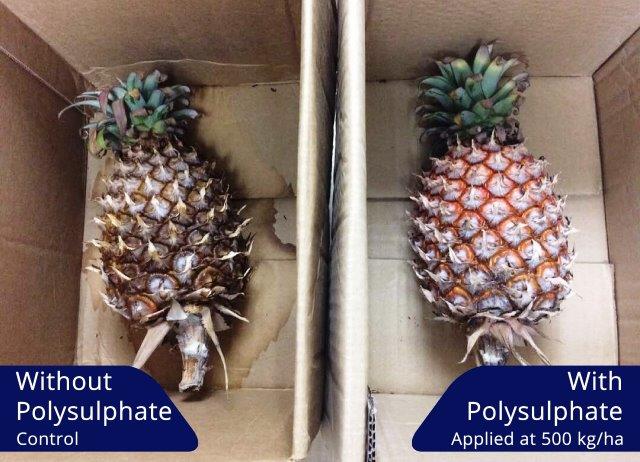

there are seventeen elements essential to plants. they are the building blocks of plant life. without enough of all these crucial nutrients, plants will not thrive, and crop productivity is severely compromised. farmers must therefore ensure their crops are nourished well.
among the essential plant nutrients, potassium (k) and secondary nutrients sulphur (s), magnesium (mg) and calcium (ca) make a particularly powerful contribution to good harvests. they significantly improve yields and they also benefit various aspects of quality. nourishing crops with these four nutrients result in more and higher value fresh fruit or vegetables and, as a result, greater income to the farmer.
crop quality depends on replenished nutrient supply
nutrients taken up from the soil by the crop to grow leaves, fruits, roots, seeds or tubers all leave the farm ecosystem at harvest. in effect, every growing season, high quantities of k, s, mg and ca are removed from the soil. the higher the yields, the higher the uptake of nutrients required. for example, at harvest, a good potato crop may remove around 300 kg/ha of potassium (k2o), 110 kg/ha of sulphur (so3) and about 20 kg/ha of both calcium (cao) and magnesium (mgo).
growing fruits and vegetables for high yield and quality depletes nutrient reserves in the land, and soils can be left deficient in essential nutrients. therefore, nutrients need to be replenished through fertilizer and manure applications to sustain an adequate supply of plant nutrients to the crops and maintain the viability of the soil and the farm business.
appreciating the role of secondary nutrients
quality in fruit and vegetable production, is more critical than with other crops. it is quality that can be key in securing the best economic return. an adequate supply of k and secondary nutrients is needed to ensure quality is delivered, whether that is size, uniformity, color, taste or shelf life.
potassium increases yield and quality of agricultural produce, enhances the ability of plants to resist diseases, insect attacks, cold and drought stresses and other adverse conditions. it helps in the development of a strong and healthy root system and increases the efficiency of the uptake and use of n and other nutrients. sulphur is part of every living cell and is required for synthesis of amino acids and proteins.
sulphur is also important in photosynthesis and crop winter hardiness. leguminous plants need s for efficient n fixation.
magnesium is an essential component of the chlorophyll molecule, with each molecule containing 6.7% mg. it is essential for photosynthesis, cell division, protein formation phosphate metabolism, plant respiration and the activation of several enzyme systems.
calcium is responsible for proper plant cell division and for strengthening cell walls. it activates enzyme systems, helps convert nitrate-nitrogen into proteins and contributes to improved disease resistance. without enough ca, roots become stunted with impaired activity. some nutritional disorders like blossom end rot (ber) in tomato, cracks in watermelon, cherries and other fruits, internal brown spot and hollow heart in potatoes are caused by low ca supply to the fruits and tubers.
polysulphate®: a new fertilizer supplying key secondary nutrients
polysulphate is a new multi-nutrient fertilizer mined in the uk by icl. it is a natural mineral (polyhalite) with a low carbon footprint and it is approved for organic agriculture.
uniquely, polysulphate contains four nutrients: sulphur, magnesium, potassium and calcium. polysulphate has a composition of sulphur (48% so3), potassium (14% k2o), magnesium (6% mgo) and calcium (17% cao), all in sulphate (so4) form. the fertilizer dissolves steadily in the soil solution, thus ensuring all nutrients are available for plant uptake during the growth period.
being a natural crystal, it has a unique dissolution pattern, releasing its nutrients gradually after being applied to the soil. the prolonged release characteristic of polysulphate means that as the four nutrients it contains are released, they provide a continuing fresh source to the growing crop. this pattern of release perfectly matches the nutrient needs of crops and minimizes the risk of leaching, which is when unused nutrients are washed away by rainfall or irrigation through the soil and into waterways.
polysulphate application can supply growing fruit and vegetable crops with all the s, mg and ca needed, and replace a significant proportion of the potassium that will be removed at harvest. in addition, it has very low salinity index as it is low in chloride, so its application minimizes the risk to crops which are chloride sensitive. lastly, with its neutral ph, polysulphate does not affect the ph of the soil.
taking all these positive unique characteristics together, polysulphate is especially suitable for fruit and vegetable crops as it conveniently provides four essential nutrients in one application and also enhances the quality so crucial in fresh produce marketing.
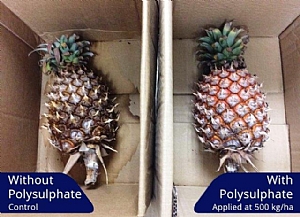
pineapples grown with polysulphate have improved shelf-life. from a trial in malaysia.
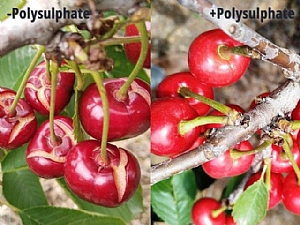
cherries grown with polysulphate demonstrate less “cherry crack” as well as being larger and sweeter than those without polysulphate fertilizer. from a trial in shandong province, china.
making a world of difference to many crops
globally, trials have shown very good yield and quality response of fruits and vegetables to polysulphate. more than 700 trials have been conducted for 57 crops in 31 countries including france, germany, the netherlands, sweden, uk, israel, china, peru, malaysia, and brazil with positive results. more and more farmers are now regularly including polysulphate in their crop fertilization schedule.
for example, a trial with potatoes carried out in inner mongolia, china by the international potash institute, showed a 21% increase in yield with polysulphate when compared to applying potassium sulphate. also in china, in guandong province, 16% more yield was achieved with polysulphate application to wax gourd when compared with the farmers’ usual practice. polysulphate was also shown to be an effective source of magnesium for pepper, showing a 19% increase in yield compared with no mg application.
in germany, polysulphate application increased the yield of potatoes by 11% and starch content by 4%. in addition, it was noted there was reduction in bruising after storage.
in india, polysulphate enhanced lycopene and ascorbic acid contents in tomato by 31% and by 21% respectively, compared with farmers’ usual fertilizer practice. in onion, polysulphate application increased yield by 38% while also increasing the quality as measured by enhanced protein content and higher tss.
also, polysulphate is proven to give excellent results for fruits: in china, polysulphate application to 5-year-old honey pomelo trees resulted in increased fruit yield and better quality parameters, especially the whole fruit size and flesh weight, and all for lower expenditure on fertilizer.
another trial, in strawberry in china, showed that when adding the same amount of k through polysulphate compared with compound fertilizer, there is a significant increase in the total acidity, fruit soluble solids, flavor, average weight per fruit, number of fruits per plant and yield.
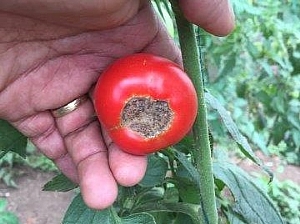
blossom end rot (ber) in tomato fruit is a physiological disorder caused by calcium deficiency. polysulphate application significantly reduced ber in a trial at popayan, cauca, colombia (photo by dr alveiro salamanca)
applying nutrient knowledge to gain crop benefits
as evidence of polysulphate’s many benefits to crops is shared with farmers, the demand for this unique, natural, multi-nutrient fertilizer grows. icl’s mine in the uk is stepping up production to meet the global need and to produce the polysulphate for delivery to farmers on five continents.
on farm, it is recommended that 400 kg/ha polysulphate is generally a suitable dose for fruit and vegetable crops. it can be applied in different ways. polysulphate can be incorporated straight into the seedbed before planting. it can be applied as a constituent of a fertilizer blend at planting. for trees and perennial crops, polysulphate can be applied at the base of the tree or bush before the next flush of growth.
in the same way that secondary nutrients are essential to crop growth and health, it is now increasingly true that polysulphate is becoming key to quality, sustainable fruit and vegetable farming around the world.
for more information, visit http://www.polysulphate.com/




